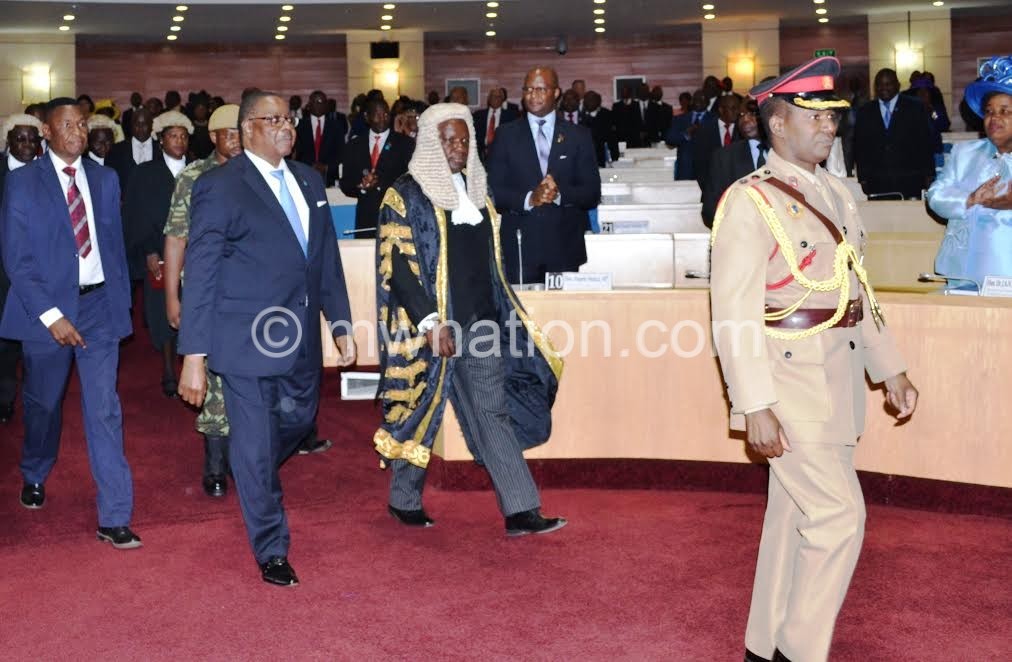Parliament pushes for independence
Parliament’s Legal Affairs Committee has made recommendations on the independence of the Legislature which include election of an outsider as the Speaker and approval and management of an own budget.
The recommendations also seek to empower members of Parliament (MPs) to hire and fire the Clerk of Parliament (CoP), the head of the secretariat for one of the three arms of government.

The proposals follow a motion by Ntchisi North MP Boniface Kadzamira (Independent) tabled in the House in November 2015, and adopted in February last year.
The committee was tasked to undertake a thorough review of all laws deemed to be in conflict with the independence of Parliament.
In an interview yesterday, Legal Affairs Committee chairperson Maxwell Thyolera confirmed that his committee is ready with the report and that it will likely be presented in the House during the current Budget Meeting of the 46th Session of Parliament.
He said: “In the review, we focused on institutional independence, financial independence as well as administrative autonomy. We also looked at how other parliaments in the region are dealing with this challenge of independence.
“It is our hope that once the report is tabled in the House, members will give a nod to the proposed amendments.”
The report, which The Nation has seen, also proposes some amendments to the country’s Constitution and the Parliamentary Service Act to be in tandem with the proposed changes.
The committee emphasises the independence and operational autonomy of Parliament so that MPs can improve their oversight functions, especially checking the Executive.
Reads the recommendations report in part: “Financial independence is the first step towards the autonomy of the legislative arm of government.
“The Latimer Principles recognise that financial independence which includes the ability for Parliament to determine its own budget and control the use of its budget is an important element in ensuring operational independence of Parliament.
“It has also been observed that where Parliament has no financial control there is danger of the Executive exerting undue control over the expenditure to the detriment of the parliamentary processes.”
On the independence of the Speaker, since the first multiparty Parliament in 1994, there have been concerns among members that the holder of the office belongs to a political party represented in the House; hence, this tends to compromise performance as issues of alleged bias arise.
The recommendations, therefore, suggest that Section 53 of the Constitution should be amended to provide that instead of the Speaker being elected from among elected members, a list of qualified names suitable for the position should be submitted to Parliament by the President and political parties represented in the House.
Reads the recommendations: “The Malawi situation where the Speaker is drawn from membership of the House is not immune from these problems [of alleged bias]. This situation can, to some extent, be resolved by considering the Zambian and Kenyan models where the Speaker is drawn from outside the membership of Parliament.”
Another contentious issue raised in the report is the recruitment of the CoP. This has paved the way to the proposal that Sections 16 and 17 of the Parliamentary Service Act be amended to allow the officer to be appointed by the Parliamentary Service Commission (PSC) and confirmed by the House through voting.
The committee argues that the current scenario, whereby the officer is appointed by the President, has negatively impacted on the administrative independence of Parliament.
It reads: “Parliament should consider the scheme being proposed in Zambia and being used in Kenya where the clerk is appointed by PSC with the approval of the House. This scheme coupled with the revised PSC composition ensures that the appointee is fully independent of Executive and fully accountable to Parliament. The same applies to the removal of the Clerk.”
Parliament also wants to have its own legal representation; hence, the recommendation that the Parliamentary Service Act be amended to include a provision allowing PSC to hire its own lawyers where it thinks fit.
Other recommendations include amending Section 7 of the Parliamentary Service Act to include leader of government business, leader of opposition and Minister of Finance, among others, in the PSC.
But an economist Henry Kachaje, while agreeing with the proposed financial independence of Parliament, said in an interview yesterday that there is still need for some degree of balancing to ensure that resources allocated are not abused.
He said: “It would indeed be ideal if Parliament had its own account because as it is now, the onus is on the President and Treasury whether funds are disbursed or not and that compromises the independence of Parliament. The MPs still need some sort of checking because if all the funds are left to themselves without control then they can start giving each other allowances anyhow.”





